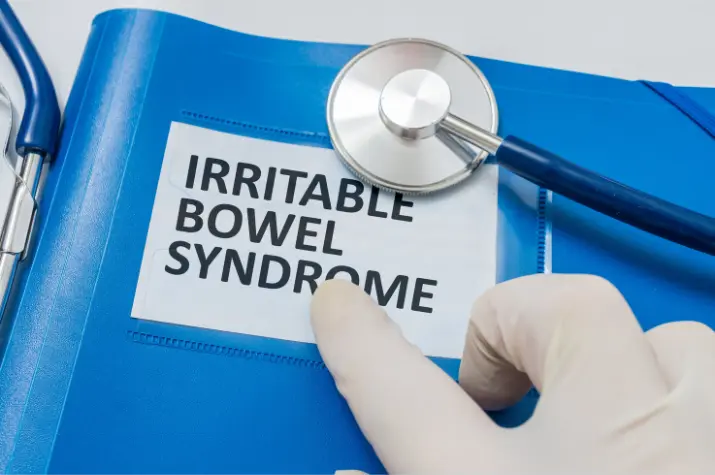
Irritable Bowel Syndrome (IBS) is a common, complex, and often misunderstood condition that affects the digestive system.
It is characterized by a range of symptoms including abdominal pain, bloating, and changes in bowel habits such as diarrhea and constipation.
Despite its prevalence, affecting millions of people worldwide, the exact cause of IBS remains elusive, with potential causal factors that include gut-brain communication errors, dietary habits, and psychological stress.
Symptoms of IBS
IBS presents a variety of symptoms that can significantly impact an individual’s daily life and overall well-being. The symptoms of IBS are diverse, often fluctuating between periods of exacerbation and remission, and they may vary from person to person.
Some common symptoms include:
- Abdominal pain and cramping: one of the hallmark symptoms of IBS, abdominal pain, is often related to bowel movements. This discomfort can vary in severity and duration, sometimes easing after a bowel movement.
- Bowel movement changes: individuals with IBS may experience changes in their bowel habits, including periods of diarrhea (IBS-D), constipation (IBS-C), or a mix of both (IBS-M).
- Bloating and gas: bloating and a sensation of gas are frequent complaints among IBS sufferers, contributing to discomfort and social distress.
- Mucus in the stool: the presence of mucus in the stool is another symptom that people with IBS may notice.
While IBS is classified as a chronic syndrome consisting of a wide range of possible symptoms, inflammatory bowel disease (IBD), is a specific condition referring to chronic inflammation or swelling of the intestines. The two are often confused by individuals seeking to understand the symptoms of chronic gastric distress.
Causes of IBS
The causes of IBS are multifaceted and not fully understood, encompassing a variety of physical, psychological, and environmental factors. Unfortunately, diagnosing IBS with a simple screening such as a blood test is not possible, but it can aid in confirming whether other conditions, such as celiac disease, may be responsible for a patient’s distress.
One possible cause is disruption in the gut-brain axis, which affects how the brain and digestive system communicate, leading to IBS symptoms. Additionally, abnormalities in the digestive system’s movements can cause symptoms like diarrhea or constipation, depending on whether these movements are too fast or too slow.
The heightened sensitivity in the gut also plays a role, making individuals with IBS more prone to experiencing discomfort from what would typically be considered normal sensations.
This increased sensitivity is likely due to more reactive nerve endings in the digestive tract. Some people develop IBS after a severe gastrointestinal infection, suggesting that such events can alter the gut’s flora and structure, triggering IBS symptoms.
Food sensitivities, particularly to high FODMAP (fermentable oligosaccharides, disaccharides, monosaccharides, and polyols) foods, can exacerbate IBS, although these reactions are not considered traditional allergies.
Psychological stressors, including anxiety and depression, further complicate IBS, pointing to the impact of mental health on digestive well-being.
Read more: Unlocking Wellness: Understanding the Role of Gut Health Test and Microbiome Analysis
What Triggers IBS?

Identifying and understanding the triggers of IBS can significantly aid in managing and reducing the frequency and severity of symptoms. While triggers can vary widely from one person to another, some common factors have been identified, such as:
- Dietary choices: certain foods and beverages can exacerbate IBS symptoms. These often include high-FODMAP foods (such as onions, garlic, beans, and certain fruits), dairy products, caffeinated drinks, alcoholic beverages, and spicy foods. Each individual’s triggers can be different, making it important to monitor and adjust one’s diet accordingly. Related.
- Stress: psychological stress is a well-known trigger for IBS symptoms. Stress can affect gut function and exacerbate symptoms. Stress management techniques such as mindfulness, yoga, and regular exercise are effective for managing IBS.
- Hormonal changes: some people find that their IBS symptoms worsen at certain times due to hormonal fluctuations, such as during menstruation. This suggests a link between hormone levels and IBS, although the exact relationship is still being studied.
- Medications: certain medications, including antibiotics and some antidepressants, can trigger IBS symptoms. It’s important to discuss any potential side effects of medications with a healthcare provider.
- Gastrointestinal infections: having a gastrointestinal infection can trigger the onset of IBS or exacerbate existing symptoms, and is known as post-infectious IBS.
- Lack of exercise: a sedentary lifestyle can worsen IBS symptoms for some people. Regular, moderate exercise is beneficial for managing the condition.
Who Is at Risk of IBS
One significant risk factor is age, with IBS more commonly diagnosed in individuals under 50 years of age. This trend suggests that younger individuals may be more susceptible to developing IBS, although the condition can occur at any age.
Gender also plays a role, with females reporting IBS at a higher rate than males. This discrepancy may be due to hormonal differences, although the exact reasons for the gender disparity in IBS prevalence are still being explored.
Family history is another factor, as having a close relative with IBS increases one’s risk of developing the condition. This familial pattern indicates that genetic components, alongside environmental factors, could influence IBS susceptibility. Psychological factors, including a history of anxiety, depression, or other mental health disorders, are also linked to a higher risk of IBS. The connection between mental health and IBS highlights the importance of the gut-brain axis in the condition’s pathophysiology.
Individuals who have experienced severe gastrointestinal infections may be at increased risk for developing IBS, a condition referred to as post-infectious IBS. This suggests that certain infections can trigger long-term changes in the gut, leading to IBS symptoms. A history of stressful life events or trauma has also been associated with a greater likelihood of experiencing IBS.
How to Treat IBS

Given the variability in symptoms and triggers among individuals with IBS, treatment plans are tailored to meet each person’s specific needs.
Here is an overview of the main treatment approaches:
- Dietary modifications: one of the first steps in managing IBS is adjusting the diet. This may include reducing or eliminating high-FODMAP foods, which are known to exacerbate symptoms in some individuals. Increasing fiber intake can help with constipation-predominant IBS, while reducing dairy and gluten may benefit others.
- Medications: there is a range of medications available to target specific types of IBS symptoms. For those with IBS-D (diarrhea-predominant), anti-diarrheal medications can provide relief, while laxatives may help those with IBS-C (constipation-predominant). Antispasmodics can reduce abdominal pain and cramping, and in some cases, low-dose antidepressants are prescribed to help control pain perception in the gut.
- Probiotics: some individuals with IBS may benefit from taking probiotics, which can help balance gut flora and reduce symptoms. However, the effectiveness of probiotics can vary, and it’s advisable to consult a healthcare provider for recommendations on specific strains and dosages.
- Stress management: given the strong link between stress and IBS symptoms, incorporating stress management techniques into daily routines can be beneficial. This may include practices like yoga, meditation, regular exercise, and cognitive-behavioral therapy (CBT) to help manage stress and reduce the impact of psychological factors on IBS.
- Psychological therapies: for some, psychological therapies such as CBT, gut-directed hypnotherapy, and counseling are effective in managing the symptoms of IBS, particularly when stress and anxiety are significant triggers.
In the United States, the National Institute of Diabetes and Digestive and Kidney Diseases (NIDDK), a division of the National Institute of Health (NIH), is the primary research institution dedicated to understanding and exploring chronic digestive health conditions such as IBS. Their website is a wealth of knowledge about IBS symptoms, treatment, and the current state of research on the condition.
Read also: [When a Prescription Is Not Needed] 6 Natural Treatments for Irritable Bowel Syndrome
When to Talk to Your Doctor
Understanding when to seek medical advice is essential for those living with IBS. If you’re experiencing new or worsening symptoms, consult with a healthcare professional immediately. This step is vital not only for adjusting your treatment plan but also for ruling out other possible health problems. Severe abdominal pain, for example, may indicate a more serious issue that extends beyond the scope of IBS and requires immediate attention.
Symptoms such as fatigue or weakness could suggest anemia, while unintended weight loss could be a sign of a more serious underlying condition. Both scenarios warrant a prompt consultation with your doctor.
Additionally, gastrointestinal bleeding, evidenced by blood in the stool or black, tarry stools, is not associated with IBS and should be investigated immediately. Difficulty swallowing and persistent changes in bowel habits, like ongoing diarrhea, constipation, or other issues, are also signs that you should speak with a healthcare provider.
Prompt communication with your doctor about any changes in your symptoms or how they impact your life is key to effective IBS management. This proactive approach allows for timely adjustments to your treatment plan, ensuring that you receive the necessary support to manage your condition effectively and maintain your quality of life.
About The Author:
Stacey Smith is a freelance health writer. She is passionate about writing about women’s health, dental health, diabetes, endocrinology, and nutrition and provides in-depth features on the latest in health news for medical clinics and health magazines.




